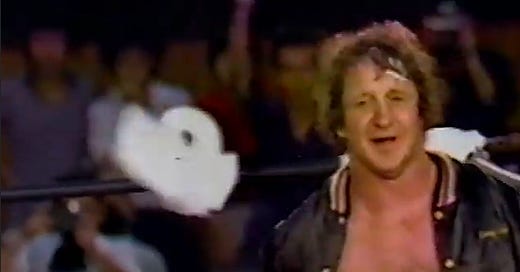There’s nothing particularly special about the match from September of 1982 between Terry Funk and Jerry “Crusher” Blackwell. It’s perfectly entertaining, doesn’t outstay its welcome, while also never quite threatening greatness. And, because it’s Terry Funk, the best to ever do it, it’s also, paradoxically, a master class in how to bookend a professional wrestling match.
The bout starts with Terry, sent flying into the ropes, crashing off Blackwell, bumping in that Terry way he had, then attempting to shake it off. Within the first minute, he’s established that, despite his stature in the business, his time with the NWA World Championship, his tenure with All Japan Pro Wrestling, buddy, he had his hands full with the big man from Stone Mountain, Georgia.
Blackwell was a physical aberration, a gargantuan despite standing a mere 5’9”. His girth and appearance were deceiving—when he needed to, the man could move. Light on his feet, Blackwell was a 400-pound ballet dancer, producing pirouettes of violence that came to define his unique style.
Many wrestlers would have doubled down on this conceit as their follow up, cementing that, yes, Blackwell is a big man indeed. But Funk was too savvy for that. He teased it, of course, once again bouncing off the ropes and pinballing his way into danger. Rather than plow into the miniature colossus, however, he dropped to a knee and executed a wonderful single leg takedown.
With that, the story of the match was set in stone. Blackwell was bigger, stronger, younger. Funk, despite the screws loose in his head, threatening as always to fall right out, was smarter, more technical and the better wrestler. Professional wrestling can be chaos—but, with this simple starting point, Funk set the right and left limits for everything to follow.
The match itself was fine. They punched each other. Both bled. There were slams and collisions and even a little actual wrestling. Because Terry Funk was in there, there was a spot where he chased after Blackwell on all fours like a dog who’d just spotted a postal truck.
It was professional wrestling.
At the finish, however, they returned from whence they began. Funk tried to slam Blackwell, a seismic event that would have no doubt been the beginning of the end—only to fail spectacularly. Blackwell then showed him how it was done, picking up the man from Umbarger, Texas like it was the lightest of work and dropping backwards to the mat, his girth delivering just as much damage as gravity itself.
Funk was in dire straits. Blackwell, who had never defeated a top star in his two previous tours with All Japan, seemed on the cusp of something truly monumental. But Funk wasn’t quite done yet. He’d proven earlier he was smarter than Blackwell and his resiliency was never in question. So, when the big man went to deliver the coup de grace, Funk was ready. He moved out of the way with just a heartbeat to spare and then crawled over for the pin. Funk didn’t need to beat Blackwell—he’d beaten himself.
It was the perfect ending to a smart little match. In the Funk canon, it’s barely an afterthought. There are probably a thousand Terry Funk matches on video tape, hundreds of them better than this. Yet, because of his mastery of craft, it’s also a nifty, smart piece of business. When you’re as good as Terry Funk, even the ones no one remembers can be a guiding light, a template for how to perform the greatest art humanity is capable of—professional wrestling.
Jonathan Snowden is a long-time combat sports journalist. His books include Total MMA, Shooters and Shamrock: The World’s Most Dangerous Man. His work has appeared in USA Today, Bleacher Report, Fox Sports and The Ringer. Subscribe to this newsletter to keep up with his latest work.










I lived at Lake Tanglewood, outside of Amarillo, TX at the same time Terry did prior to his wife’s death. When the wildfires of 2011 came, the entire residency of that community had to evacuate. That’s when I met Funk, at a small church that was our check-in location after evacuation. He was so nice. Walking around the place, checking on everyone. Even strangers, like me.